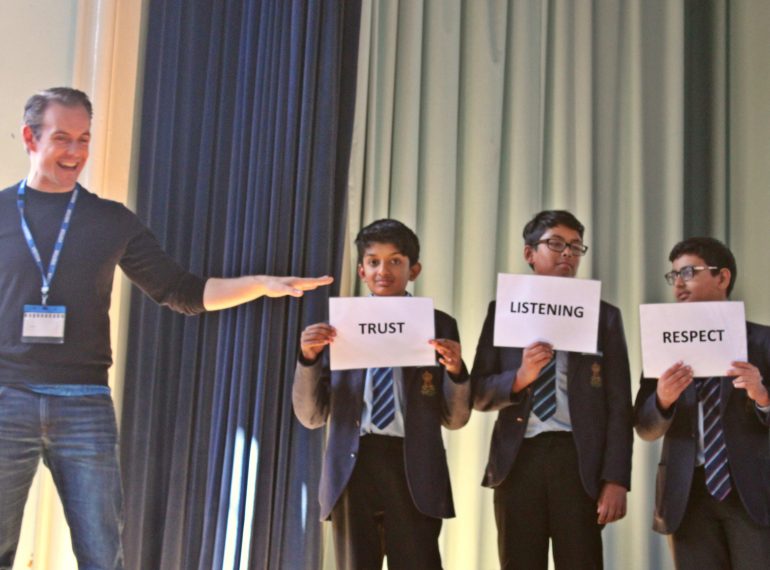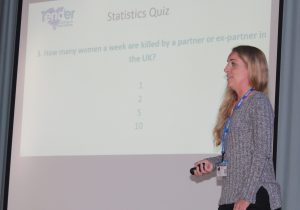
Boys in Year 9 explored what makes relationships healthy and unhealthy in an hour-long assembly devoted to the topic of domestic abuse and sexual violence.
Led by representatives from Tender, a charity ‘acting to end abuse’, the boys learned about the huge scale of the domestic violence problem – one in three women and one in five men will be impacted by it. Tender’s Emily Whyte and Andrew Macklin highlighted some stark facts: on average, two women are killed each week in the UK by a current or former partner, and for men, the figure is about two per month. Overall, about 85% of victims of domestic violence are women.
 The boys were also told that it is very much a young people’s issue – statistics show that those aged 16-24 are the demographic mostly likely to suffer domestic violence. The highly interactive assembly included a discussion about ‘sexting’ that followed the screening of a film featuring a case study, entitled #ListenToYourSelfie. The discussion covered appropriate and inappropriate communication through technology and in online relationships. It focused on matters of trust, coercion and manipulation, as well as how to stay safe, the dangers of sending explicit images and an understanding of the law in this area.
The boys were also told that it is very much a young people’s issue – statistics show that those aged 16-24 are the demographic mostly likely to suffer domestic violence. The highly interactive assembly included a discussion about ‘sexting’ that followed the screening of a film featuring a case study, entitled #ListenToYourSelfie. The discussion covered appropriate and inappropriate communication through technology and in online relationships. It focused on matters of trust, coercion and manipulation, as well as how to stay safe, the dangers of sending explicit images and an understanding of the law in this area.
Headmaster Neil Enright said: “As a School, we are committed to exploring these serious issues and to building awareness and understanding among our pupils, not least because of the prevalence of domestic violence among young people across the country, as the statistics reveal.
“There will be follow-up to these discussions in form groups as part of our Personal Development Time programme; in fact, we are increasingly using such special assemblies to support the programme and to give boys an additional insight and point them towards external sources of advice and support.”
There was discussion of the different forms that domestic violence can take, with the definition having been expanded in recent years beyond purely physical abuse to include areas such as controlling behaviour and emotional abuse. Boys were told that physical violence is usually preceded by at least two or three other expressions of domestic abuse.
 The assembly included a quiz on healthy relationships and an activity in which boys were asked to arrange a list of behaviours along a line from ‘most healthy’ to ‘most unhealthy’. This stimulated discussion of various forms of behaviour which was geared towards helping boys identify what positive, respectful relationships based on equal power look like and, conversely, helping them to identify unhealthy relationships.
The assembly included a quiz on healthy relationships and an activity in which boys were asked to arrange a list of behaviours along a line from ‘most healthy’ to ‘most unhealthy’. This stimulated discussion of various forms of behaviour which was geared towards helping boys identify what positive, respectful relationships based on equal power look like and, conversely, helping them to identify unhealthy relationships.
This debate concluded that, of the terms provided, ‘respect’ was the most important ‘healthy’ factor, followed by ‘trust’ and ‘listening’. There was mature debate around matters such as jealousy, control, secrets and cheating, with the discussion considering the moral, ethical and legal aspects of such behaviours.
The representatives from Tender finished by encouraging boys to think about who in their lives they could turn to for help and support if they had a concern or wanted a second opinion on a relationship. They also ‘signposted’ the boys to publicly available support services and – should they be needed – ways of reporting issues in this area.
